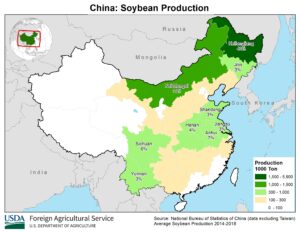A prolonged military conflict in the Middle East could potentially upend key commodity markets due to Iran’s control of the Strait of Hormuz, one of the world’s most important trade…
New Report: China Failed Trade Commitments; While Continuing to Focus on Domestic Ag Production
New U.S.T.R. Report
New York Times writer Ana Swanson reported today that, “The Biden administration criticized China in a new report released Wednesday morning for failing to uphold a wide range of trade commitments, including promises it had made when it joined the World Trade Organization in 2001 and others in a trade deal signed with the Trump administration in 2020.
“In its annual assessment of China’s compliance with its obligations to the W.T.O., the Office of the United States Trade Representative excoriated the Chinese government for flouting the global trade body’s rules and its transparent, market-oriented approach. Instead, China expanded its state-led approach to its economy and trade, causing serious harm to workers and businesses around the world, particularly in industries targeted by its industrial plans, Katherine Tai, the U.S. trade representative, said in a statement.”

Swanson explained that, “The report also criticized the trade deal signed by the Trump administration, in one of the first written assessments the Biden administration has provided of China’s progress toward the terms set out in that deal.
The Biden administration has said it intends to hold China to the terms of that agreement, while also calling for a different approach to trade. But it has not clarified just how assertively it would enforce a deal it has described as fundamentally flawed.
Today’s Times article added that, “The report said that the deal had failed to address the most fundamental concerns the United States has with China’s approach to trade, and that the United States had serious concerns with China’s implementation of several of its commitments. Those included pledges to purchase U.S. goods and services, as well as promised reforms related to agriculture, particularly biotechnology, and an assessment China promised to conduct on the use in swine and cattle of ractopamine, a feed additive widely used in the United States that Beijing has banned.”
Also today, Wall Street Journal writer Josh Zumbrun reported that, “The [USTR] report stopped short of detailing any specific actions that it may take, however, nor did it provide any guidance as to how quickly the administration might act.”
Bloomberg writer Eric Martin reported today that, “China had pledged to buy the extra $200 billion in U.S. agriculture, Tai has said repeatedly that the Biden administration’s concerns go beyond the purchase commitments and include Beijing’s state-centered industrial policy.”
And Reuters writer David Lawder pointed out today that, “[The USTR report] also said China had failed to make good on other Phase 1 commitments. These include regulatory approvals for American agricultural biotechnology and a risk assessment on the use of ractopamine, a feed additive used to produce leaner pork and beef in the United States.”
China Focus on Domestic Ag Production, Food Security
Meanwhile, Bloomberg News reported earlier this week that, “Premier Li Keqiang said China will increase support for agriculture in spring, in an effort to ensure the nation’s ‘stable and healthy’ economic development, the official Xinhua News Agency reported.
“China will ensure adequate supplies of fertilizers and other goods used in farming, and stabilize their prices, Li said in written remarks to a national agriculture meeting held Sunday, according to Xinhua. China seeks full-year grain output of above 650m tons to ensure foood security, Li said.”
And Reuters writer Dominique Patton reported today that, “China can reduce its soybean demand by 30 million tonnes by continuing to promote lower soymeal rations in feed and using alternative proteins, the official Xinhua news agency said on Wednesday, citing unnamed agriculture officials.
“China issued guidelines last year recommending the reduction of soymeal and corn in pig and poultry feed, as it sought to reduce its dependence on imported grains.
“China imports almost 100 million tonnes of soybeans each year to make protein-rich soymeal for its huge livestock sector.”
Earlier this week, Reuters News reported that, “China’s Inner Mongolia region, the country’s second-largest soybean growing area, will expand planting of the oilseed by 287,000 hectares in 2022, state media reported on Monday.

“The northern region, located in the country’s grain basket, said it would expand soybean acreage through crop rotation programmes and increase subsidy differences between soybean and corn to encourage farmers to grow more of the oilseed, Xinhua news agency reported.”
In the nearer term, Reuters writers Hallie Gu and Gavin Maguire reported late last week that, “China’s soymeal futures soared to record highs this week on concerns about the scale of South America’s drought-hit soybean crop and tightening meal supplies in domestic markets.
“Elevated prices of soymeal, the top protein ingredient in animal feed, could lift production costs for Chinese hog farmers who are already struggling with huge losses, and may push some to exit the market, traders and analysts said.”
The Reuters article added that, “Chinese importers had been counting on abundant and cheap soybean supplies from Brazil to start arriving this month and fulfil their needs for the first quarter of 2022. But the South American crop issues have now caught some off guard.”





